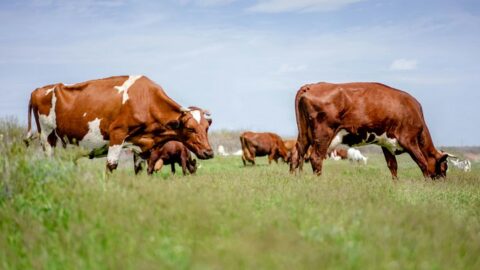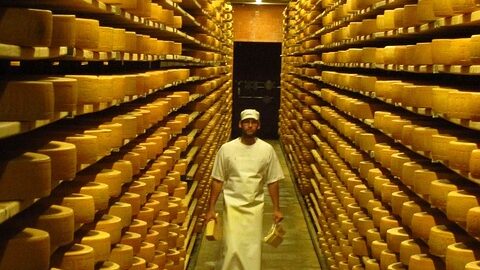Churn and cheese: three reasons why you need to buy cheese from NZ’s small cheesemakers

The good and the bad, the rough and the smooth, light and dark, yin and yang. The joyous celebration of the fabulous artisan cheeses made by Kiwi small cheesemakers at the Champions of Cheese Awards in May is tempered by the knowledge that each year we lose a valued cheesemaker or two.
Losing talented cheesemakers
Churn is a good thing when you’re making cheese, but a sad thing when it means cheesemakers exiting the industry.
At The Cheese Wheel we were certainly sad when Catherine and James at Grinning Gecko in Whangarei recently decided to call it a day after ten years of hard work and creativity. We regularly included their cheeses in our monthly subscription boxes, and they always got great feedback. We already miss their Parmesan-style Parihaka, their brie and their camembert, their Marore washed rind, their caraway seed Havarti, their Reka Rawa Truffle Brie, and so on.
Theirs is a story typical of small cheesemakers in Aotearoa. Bored with their corporate careers, they followed their passion and learnt how to make great cheese. They focused on cow’s milk cheeses, but were also exploring buffalo and goat milk cheese. They were keen on organic methods, and best of all, they were keen on experimenting. This included a mischievous side like manufacturing a “white Red” Leicester.
Their commitment to a te ao Maori perspective showed in how they named their cheeses. Their cheesemaker became famous too, more on this in this 1news feature ‘I’m just a humble cheesemaker’.
Another cheesemaker to close up shop not too long ago was in Taranaki. She ran 22 Jersey cows and produced the most beautiful brie and other soft cheeses. She could not make it work financially, telling me that she spent 35% of her revenue on compliance. That’s tough, one of the things we do at The Cheese Wheel is provide a channel to a broader market for small cheesemakers, but our friend in Taranaki just couldn’t afford to ramp up production to get ahead of her costs, let alone meet our orders. A huge shame.
We know of other cheesemakers on the edge. Two are at risk because they are getting old and it’s hard work making cheese, and even more so if you’re the farmer too. Another is at risk because they had to reduce their stock numbers during Covid and they are in a bind balancing investing in more stock with spending their limited resources on marketing.
The problem: getting the good cheese to the people
The old industrial economy was all about economies of production (supply). Bigger and bigger factories pumping our mass-produced goods at the lowest possible cost. That’s why we ended up with lumpen, bland cheese in big blocks in our supermarkets. The digital economy has reversed this model to the benefit of you and me, the consumers, the cheese lovers.
Supermarkets and many other outlets including some delicatessens are still dominated by this model – shifting big volumes at low cost to them (but maybe not low prices to their customers). It means that they have great buying power. That means that small cheesemakers either can’t produce enough volumes to interest supermarkets or other outlets, or they are forced to sell at very thin margins. A tough business indeed.
The Cheese Wheel reverses this model. We are a digital platform that is all about the economies of consumption (demand). Through us, cheese lovers from Tuatapere to Ahipara can enjoy cheese made across Aotearoa. We bring better cheese to the people.
It also means that our small cheesemakers have a new and seamless (we do the marketing and distribution) channel to market.
Three reasons to buy cheese from small cheesemakers
There are three most excellent reasons to buy cheese from artisan cheesemakers, so let’s run through them.
Better cheese
In January 2019 the NZ Herald published Big read: Will cheese become New Zealand’s next craft beer? – NZ Herald an article I wrote about how artisan cheese was set to follow craft beer as the next big thing in our foodie universe. The deregulation of the dairy industry in the early 2000s led to an explosion of new cheesemakers. We feature more than 30 on our website, and there are about another dozen or so around the country.
In my earlier article, I talked about how cheese consumption is increasing fast on every continent, and a growing portion of that increase is specialist cheese. Barry’s Bay have been making their famous cheddar since the 1890s, Evansdale their oozy brie since the 1970s, and Kingsmeade their Sunset Blue cheese, and many other varieties they developed themselves using milk from their own breed of sheep, since the 1990s.
Now there are small cheesemakers crazy-dedicated to their vision of better cheese up and down NZ, like Belle Chevre with their goat’s milk halloumi, Massimo’s with their burrata, Anabelle with her delicate bouchees, Mahoe and Mercer each with their famous gouda, Taiba with their cheese styles from the Levant, and Clevedon with their marinated buffalo cheeses in Northland and Auckland. Waikato/Bay of Plenty has Cilantro and their chocolate cheese, The Cheese Barn with their sun-dried tomato and basil feta, Meyer with their vintage cumin gouda, and Mt Eliza with their stunning Blue Monkey.
Tairawhiti is lucky to have Waimata with their double cream camembert, and further south, Hawkes Bay is a hotbed with Nieuwenhuis and their range of soft goat cheese logs, Hohepa with their Danbo, Origin Earth and their pecorino, and Craggy Range with their gorgeous blue cheese. Manawatu and the Wairarapa pull their weight with Cartwheel Creamery and their beer-washed Tomme and The Drunken Nanny with their soft goats’ cheese.
Hungry? Let’s not forget ViaVio in Nelson and their Stracchino, the Wildfire washed rind made by their neighbours Thorvald, or the semi-soft white rind cheese made by their other neighbours, Kervella. Over the hill in Marlborough, you’ll find an ashed goat cheese made by Cranky Goat. In Canterbury you can enjoy fresh cheese from the Little Farm Goat Dairy, an aged cow’s milk gouda from Karikaas or a sheep milk gouda from Jones Family Farm, a buffalo bocconcini from Wairiri Buffalo, or a Waihi Blue Shropshire style cheese from Geraldine Cheese.
Get the picture? That’s just a small window into what is available beyond your local supermarket or deli. Even better, lots of the cheesemakers won’t stop inventing new cheeses, making our lives even better
Supporting our small artisans
It’s not always easy to buy local or hand-crafted products, especially because they aren’t always the cheapest. Having quality cheese in our lives makes for better living though, even if it’s a treat. Its also important to recognise the embedded value – the quality ingredients, the traditional techniques, the expensive equipment, the high hygiene standards, and the compliance costs that come with that. Then there are the wonderful recipes, and of course the love of the hardworking cheesemakers.
The second reason to buy cheese from our small cheesemaker is if we don’t, we won’t have any small cheesemakers. It’s a win-win supporting them – we eat better cheese and they make a living. If we don’t, we eat bad cheese or chew up carbon miles with our imported cheese.
Make New Zealand a better, more prosperous, and more harmonious place
Dairy is one of our biggest industries, but we have always struggled to add value. The industry remains largely a commodity business, like exporting pine logs for someone else to add value to.
Artisan cheese is the epitome of adding value to dairy. Take the same ingredients of milk, salt and rennet and create something magical, not just a block of rubbery yellow stuff. We’re behind our OECD peers too because we eat a lot less cheese than people in those other advanced countries. Artisan cheese can take off like wine and then craft beer, we just need to buy the stuff, and that means we need to have ready access to it.
Growing the artisan cheese sector will lead to more skilled jobs, again just like the burgeoning craft beer sector (and the rising artisan spirits sector). More skilled jobs mean better pay, which means more prosperity for all as those dollars circulate around the economy.
Will eating more and better cheese really make Aotearoa a more harmonious place? Have a look at this article Can cheese make you happy? 3 Need-to-know facts about cheese | The Neff Kitchen which explains how casein can engender feelings of euphoria, and also act as a powerful pain reliever. Cheese is also just a tiny bit addictive but then you knew that!
Bringing better cheese to the people
Better cheese makes you feel better, supports small scale artisans, and generates good jobs. At The Cheese Wheel we’ve solved the last problem standing in the way of you joining the better cheese movement by delivering curated boxes of cheese to our door every month. Come on board!
July 2023 – By Kevin Jenkins
Also published in the NZ Herald









